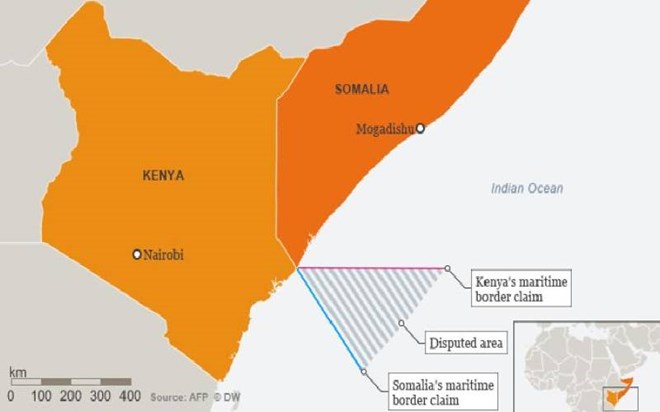
Saturday October 9, 2021
Nairobi (HOL) - Kenya has announced that it rejects the International Court of Justice (ICJ) jurisdiction to rule in a maritime border dispute with Somalia.
A statement issued on Friday by Foreign Affairs Principal Secretary Amb Macharia Kamau said that Kenya would disagree with the judgment scheduled for next week.
“In addition to withdrawing its participation from the current case, Kenya … also joined many other members of the United Nations in withdrawing its recognition of the court’s compulsory jurisdiction,” the foreign ministry said on Friday.
At the time, both sides said the recognition came with "[n]o condition or reservation to either declaration".
Kamau further said that the judgment would have a significant impact on matters of security, politics, economy and society, not only between the two countries but also the region.
Kamau noted that already there is an issue within the East African region on matters of instability.
“The delivery of the judgment will be the culmination of a flawed judicial process that Kenya has had reservations with and withdrawn from, on account not just of its obvious and inherent bias but also of its unsuitability to resolve the dispute at hand,” said Kamau.
He said that Kenya would no longer be subject to international court without its consent. The PS noted that the Kenyan government would not in any way agree or recognize the ruling.
On the day the hearing was set to begin, Kenya notified the court that it would not proceed with the oral proceedings, despite actively participating in written proceedings.
Kenya's Ministry of Foreign affairs said that it had pulled out for many reasons, including the court's bias, the format of the hearing, and claims that powerful foreign entities are fuelling Somalia's claims.
Kenya argued for a further postponement to the ICJ case be postponed due to the COVID pandemic, but the court refused.
The move to postpone the case was the fourth time Kenya had asked for more time on the matter.
The maritime dispute began in 2014 when Somalia filed a territorial ownership case at the ICJ challenging a 2009 agreement with Kenya that set its maritime border along latitudinal lines. At stake is a 150,000 square-km triangle of water potentially rich in hydrocarbons, fish and other resources.
Kenya rejected the court's jurisdiction at the time, but the court ruled that it was within its rights to rule on the case. It has consistently sought a negotiated settlement to the case.
Two weeks ago, President Uhuru Kenyatta, who met top military officials, said that Kenya would do all it takes to protect its borders.
Speaking in Boni Forest Lamu county, President Kenyatta said during a ceremony commemorating the upgrading of a naval base that he would ensure that the country’s borders are protected.
“Those who think we are not ready to take care of our boundaries will be in for a rude shock,” he said.
According to Kenyatta, Kenya respects other countries' boundaries and will not relent to protect its borders.
Somalia has rejected diplomatic pressure to resolve the issue outside of the international court, saying that it would wait for a ruling from the UN court.
The case has resulted in deeply strained relations between the two east African neighbours.